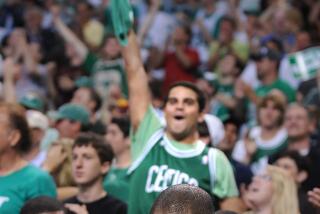The Sale of Celtic Stock Raises Some NBA Salary Cap Questions
- Share via
The sale of 2.1 million shares of Boston Celtic stock on the New York Stock Exchange has created ripples that threaten to rock the economic equilibrium of the NBA.
The stock offering, representing 40% of the club’s ownership, went on the market nearly two weeks ago and was quickly gobbled up by Celtic fans who paid as much as $19.50 a share for a piece of a dream.
Overnight, a franchise that was purchased for $19 million in 1983 was catapulted to a value estimated at nearly $119 million. But the true impact of the stock sale on the business of professional basketball may be felt when the players and owners sit down to discuss a new collective bargaining agreement in January.
At stake is the future of the NBA’s salary cap, claimed by many to be the most vital element in the economic renaissance enjoyed by the league over the last three years.
“We feel it (the Celtic stock sale) indicates that we now need a free enterprise system in the NBA for both owners and players,” said Charles Grantham, executive vice president of the NBA Players’ Association. “There is a limit with the cap on the players’ salaries but not on how much an owner can make.”
The NBA, meanwhile, maintains the stock offering will have no effect on the league as a whole.
“I don’t see what it (the Celtic stock sale) has to do with the salary cap,” said Russell Granik, the NBA’s executive vice president. “I don’t think anybody has ever said the Celtics were pleading poverty.”
The salary cap was the keystone of an economic recovery plan reached between the league and the players’ union in the dark days of the 1983. At the time, NBA owners were considering whether to fold as many as four teams and could not find buyers for two others.
The cap called for a limit on each team’s single-season payroll that was determined by a complex formula based on the league’s total revenue.
The cap for each team has grown from $3.2 million in 1984, to $4.2 million in 1985 and $4.95 million in 1986. However, there are a number of loopholes in the cap allowing veteran players to be paid big salaries, especially in deferred payments.
“I think the collective bargaining agreement of 1983 was the turning point for the league,” NBA Commissioner David Stern said. “It avoided a strike and has telescoped into stability in the league.”
Since the agreement went into effect, the numbers have been golden for the league. The NBA’s gross revenues have grown from $120 million in 1983 to $250 million in 1986. The average player’s salary has escalated from $260,000 to about $400,000 this season.
The league’s television contract with CBS has grown from an $88 million, four-year deal to a recently signed four-year contract worth $173 million. Turner Broadcasting’s cable contract has grown from a $20 million, two-year agreement to $25 million over the same time span.
The improved economic climate and the amount of cash raised in the Celtics deal have made many player agents wonder if their clients should be getting a bigger piece of the profits.
“We agreed to the cap because it was good for the industry,” said sports attorney Bob Woolf, Larry Bird’s Boston-based representative. “We were not against an owner getting a return on his investment. But something has occurred (the Celtic stock sale) that was unforeseen at the time by both the league and the players association--that there could be such a windfall.
“It seems to be unjust that they would maintain a salary cap when owners could at the same time earn such astronomical sums.”
Leonard Armato, the Los Angeles-based attorney representing Kareem Abdul-Jabbar, said he hopes the NBA will now fall in line with other industries.
“In other areas of businesses when an employee is so important to the final product he is given stock options,” Armato said. “In five years, when the employee leaves he can cash in those options and make some extra money. I would think a player like a Bird or Kareem, if the Lakers issue stock, should get such an option. After all, all a team has is its players.”
Besides giving strength to the players’ arguments for lifting the salary cap, the Celtics’ stock offering also has raised questions about the franchise.
“This seems to go against the new tax laws,” said Roger Noll, a Stanford economist who watches the sports industry. “With the new tax laws, it’s in the interest of major corporations to own basketball franchises, not rich individuals.
“If you sell off 40% of your team in a stock offering, that makes it less attractive to the big corporations to buy the team because it cuts into their tax advantages.”
The stock offering is not a first-time economic strategy for an NBA franchise. Seattle, Milwaukee and Cleveland, all were publicly held franchises in their infancy. The New York Knicks currently are owned by Gulf & Western, a publicly held conglomerate.
“Milwaukee sold its stock in 1968 for about $5 a share,” said Golden State Warriors owner Jim Fitzgerald, who owned the Bucks in the 1970s. “I think they sold something like 586,000 shares. At its peak, the stock got up to about $16 a share. It then dropped to $4.50 a share. When I bought the majority interest in the team, I paid $8 a share.”
The Boston offering has seen a similar drop in the last few days. On Dec. 17, the Celtic stock had dropped from $19.50 to $15.87.
Analysts say the reason for the fluctuation in basketball stock is there is little physical property. The owner of Celtic stock owns only a part of 12 players and uniforms, not a share in the Boston Garden. That is not the case in Canada where investors in Maple Leaf Gardens Ltd. have watched their stock climb from $50 a share to a high of $127 a share last year. Owners of Maple Leaf stock own a piece of the NHL’s Toronto Maple Leafs, but they also own interest in Maple Leaf Gardens.
“The teams make nothing--sports teams are basically a break-even proposition,” said Maple Leaf Gardens spokesman Gord Stellick. “We make more money on the other events, like rock shows.”
The Celtic stock also will not likely increase the average open market price of an NBA team, currently in the $27 million range.
“It’s not going to have an impact on the value of sports franchises,” said Michael Magna, an official with the American Appraisers Assn., a Milwaukee-based company that appraisers sports franchises. “I think the Celtics are a unique franchise. People have been exposed to the image of the Celtics and wanted a keepsake type of thing.”
Vince Boyla, president and general manager of the Denver Nuggets, agrees.
“I think the sale shows that certain franchises are worth more money, but there will be no blanket effect on the league,” he said. “The Celtics are a unique team in a unique situation. You don’t use the same approach with a lot of other clubs out West and that don’t have the history of success that the Celtics do.”
Fitzgerald said other teams might be able to attempt a similar undertaking, but on a smaller scale.
“I would think the Lakers would be the only other team that could do it,” he said. “I think it’s possible alternative for any team, but not on the grand scale of the Celtics.”
More to Read
All things Lakers, all the time.
Get all the Lakers news you need in Dan Woike's weekly newsletter.
You may occasionally receive promotional content from the Los Angeles Times.







